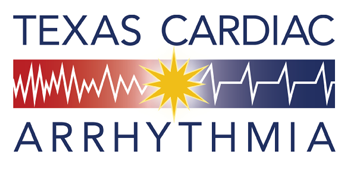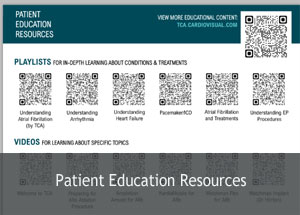Patient Education
Risk Factors & PreventionArrhythmia Prevention
Prevention falls into two main categories: preventing heart disorders in general and monitoring and treating any existing heart problems.
Preventing Heart Disorders
Treat or, when possible, eliminate risk factors that may lead to cardiovascular disease or cardiac arrhythmias.
- Make healthy lifestyle choices. Living a “heart healthy” life is the best way to decrease the chances of developing heart disorders. Exercising regularly and eating a healthy, low-fat diet with plenty of vegetables, fruits and other vitamin-rich foods are the cornerstones of “heart healthy” living.
- Maintain a healthy weight
- Stop smoking and avoid secondhand smoke. Tobacco contributes to as much as one-third of all cardiovascular disease. To help you stop smoking, visit this helpful website: Visit Plan My Quit
- Avoid or limit the intake of caffeine, alcohol and other substances that may contribute to arrhythmias or heart disease.
- Avoid unnecessary stress, such as anger, anxiety or fear, and find ways to manage or control stressful situations that cannot be avoided.
- Have regular physical exams and promptly report any unusual symptoms to a physician.
- Seek treatment for underlying health problems that may contribute to arrhythmias and heart disease. Problems include atherosclerosis (“clogged” arteries), heart valve damage, high blood pressure, high cholesterol, diabetes and thyroid disease.
Risk Factors
Monitoring and Treating Existing Heart Disorders
Effectively treating any existing heart disorder is the best way to prevent it from becoming more severe.
- Have regular check ups.
- Understand how various conditions increase the risk of arrhythmias.
- Learn about heart disorders, tests and treatment options, and discuss them with caregivers.
- Find out if the heart’s electrical system and its ability to pump blood efficiently have been affected by heart muscle damage from a heart attack or another cause.
- Learn the importance of an ejection fraction (EF). EF is a measure of the proportion, or fraction, of blood the heart pumps out with each beat. An abnormally low EF is the single most important factor in predicting the risk of sudden cardiac death.
- Follow treatment plans, and take all medications as prescribed.
- Report any new symptoms or changes in existing symptoms to physicians as soon as possible.




